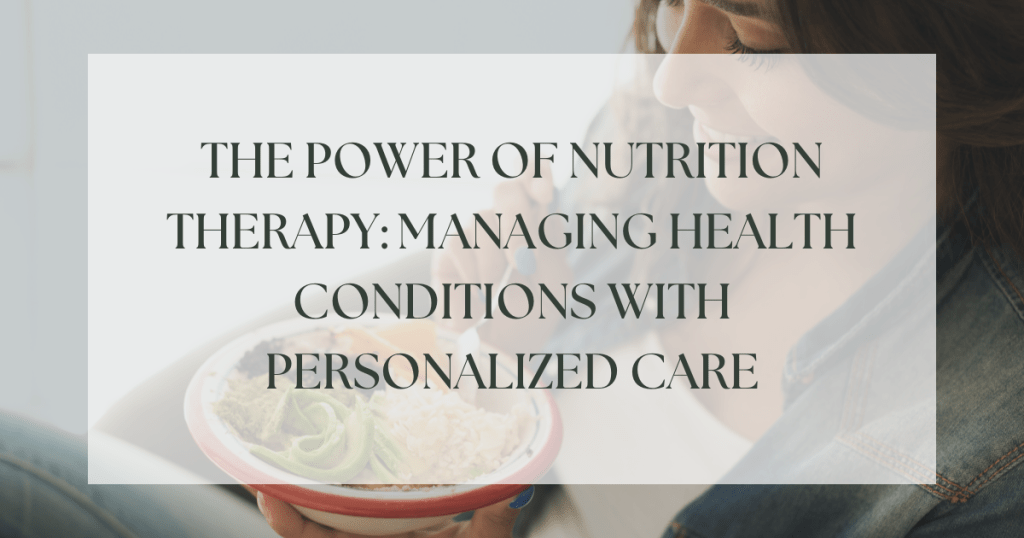Nutrition therapy is a powerful tool that can significantly impact our health and well-being. Through personalized guidance and evidence-based approaches, a registered dietitian can help manage various health conditions. In this article, we will explore how nutrition therapy can support individuals with common conditions, such as diabetes, gastrointestinal disorders, food allergies, eating disorders, cancer, weight management, heart disease, renal disorders, autoimmune disorders, and mental health disorders. Let’s delve into the world of nutrition therapy and discover how it can improve your overall health and quality of life.
Diabetes Management Made Easier:
Living with diabetes requires careful attention to diet and blood sugar control. A registered dietitian can provide invaluable support in understanding carbohydrate counting, portion control, and balanced meals to regulate blood sugar levels. By working together, you can take control of your diabetes and optimize your health.
Finding Relief for Digestive Issues:
Gastrointestinal disorders like GERD, gastritis, and IBD can significantly impact daily life. Through nutrition therapy, a dietitian can help identify trigger foods, recommend dietary modifications, and guide you in adopting gut-friendly options. By making informed dietary choices, you can reduce symptoms and improve your digestive health.
Navigating Food Allergies and Intolerances:
Dealing with food allergies or intolerances can be challenging. A registered dietitian can assist in managing conditions like lactose intolerance, celiac disease, or food sensitivities. They will work with you to identify trigger foods, ensure nutrient adequacy, and develop personalized meal plans to maintain a balanced diet.
Recovering with Nutritional Support:
Eating disorders require a comprehensive treatment approach, and nutrition therapy plays a crucial role in the recovery process. A dietitian can help you establish a healthy relationship with food, develop personalized meal plans, and provide the necessary support for your journey to recovery.
Supporting Your Health Through Nutrition during Cancer Treatment:
Cancer treatment can take a toll on the body, and nutrition therapy becomes essential in supporting overall health and well-being. A registered dietitian can assist in managing side effects, optimizing nutrient intake, and providing guidance for maintaining strength during treatment and recovery.
Personalized Strategies for Weight Management:
Whether you aim to lose or gain weight, a registered dietitian can provide tailored guidance. They will help you develop sustainable eating plans, offer practical tips, and create long-term strategies for successful weight management based on your individual needs and goals.
Heart-Healthy Eating for a Stronger You:
Heart disease is a prevalent condition that can benefit from a heart-healthy diet. A dietitian can recommend dietary changes to manage high blood pressure, cholesterol levels, and overall cardiovascular health. They will guide you in reducing sodium and saturated fat intake while ensuring proper nutrition for optimal heart health.
Optimizing Kidney Health through Nutrition:
Individuals with renal disorders, such as kidney disease or those undergoing dialysis, require specialized nutrition support. A registered dietitian can assist in managing fluid balance, recommending a kidney-friendly diet, and ensuring proper nutrition while controlling phosphorus, potassium, and protein intake.
Managing Autoimmune Disorders through Nutrition:
Autoimmune disorders can be managed with the help of an anti-inflammatory diet and nutrient-rich foods. A dietitian can guide you in making dietary choices that support immune function, reduce inflammation, and optimize overall health.
Enhancing Mental Health through Nutrition:
The link between nutrition and mental health is significant. A registered dietitian can recommend foods that promote brain health, support neurotransmitter production, and optimize nutrient intake to enhance mental well-being. By prioritizing your nutrition, you can nurture both your body and mind.
Nutrition therapy offers a holistic and personalized approach to managing a variety of health conditions. By working with a registered dietitian who follows evidence-based practices, you can receive tailored guidance and recommendations rooted in scientific research. Whether you are dealing with diabetes, gastrointestinal disorders, food allergies, eating disorders, cancer, weight management, heart disease, renal disorders, autoimmune disorders, or mental health disorders, nutrition therapy can significantly improve your overall well-being.
Remember, the field of nutrition is constantly evolving, with new studies and research emerging. By partnering with a registered dietitian, you can stay up-to-date on the most effective strategies for managing your specific condition and optimizing your health. Embrace the power of nutrition therapy and take control of your health journey today. Your body will thank you!


